X: @vivekbhavsar
Mumbai: If the rumours circulating in the political corridors are to be believed, there’s a possibility that Chief Minister Eknath Shinde could be replaced by a Bharatiya Janata Party (BJP) leader after the Lok Sabha election results are announced on June 4. These rumours suggest that the central BJP leadership is convinced that the party may struggle to win the state assembly polls in Maharashtra under Shinde’s leadership.
The claim that Mahayuti in Maharashtra will not win more than 23 seats, according to a highly placed source from the BJP, adds weight to the speculation of a potential leadership change. It indicates a lack of confidence in the current leadership’s ability to secure electoral success.
If these rumours hold any weight, a major leadership change could be on the cards. Eknath Shinde’s potential replacement by a BJP leader suggests a shift in strategy, perhaps driven by concerns over electoral performance. The potential replacement of Chief Minister Eknath Shinde by a Bharatiya Janata Party leader suggests a shift in strategy, perhaps driven by the belief that the current leadership might not be able to secure the desired electoral outcome for the BJP in the upcoming state assembly polls.

Eknath Shinde’s assertiveness during the seat-sharing discussions for the ongoing Lok Sabha polls seems to have been effective in securing a significant number of seats for his faction of the Shiv Sena. However, it also appears to have caused dissent within the state BJP, with some members expressing doubts about the decision to allocate 15 seats to Shiv Sena. The BJP’s scepticism about Shinde’s ability to win more than five seats suggests internal disagreements and differing perceptions of electoral prospects. This discord could be reflective of broader tensions within the Mahayuti alliance in Maharashtra.
Maharashtra elections hold significant weight in the overall political landscape, potentially impacting Narendra Modi’s bid for a third consecutive term as Prime Minister. The dynamics within the NDA or Mahayuti alliance are crucial, especially considering the historical performance of the BJP and the CM Eknath Shinde led Shiv Sena faction in the state. The historical performance of the BJP-Shiv Sena (undivided) alliance in the state, as evidenced by their impressive tally of 41 seats in the 2019 Lok Sabha polls, highlights the significance of Maharashtra in the national electoral calculus.
However, the current uncertainties surrounding the alliance, coupled with internal disagreements and speculation regarding leadership changes, could potentially impact the alliance’s electoral prospects in the state. The absence of a solid projection for the NDA, or Mahayuti, in Maharashtra suggests that the state’s outcome may not be as predictable or favourable for the ruling coalition as in previous elections.
In the 2019 Lok Sabha polls, when Shiv Sena and the Nationalist Congress Party were not split, the BJP alone bagged 23 seats, whereas an independent Navneet Rana, who won the Amravati seat, extended her support to the BJP. Shiv Sena had bagged 18 seats in the state. Hence, the tally of the BJP-Shiv Sena alliance was 41. However, the current uncertainties and internal disagreements within the alliance could pose challenges to replicating or even maintaining that success in the upcoming elections.
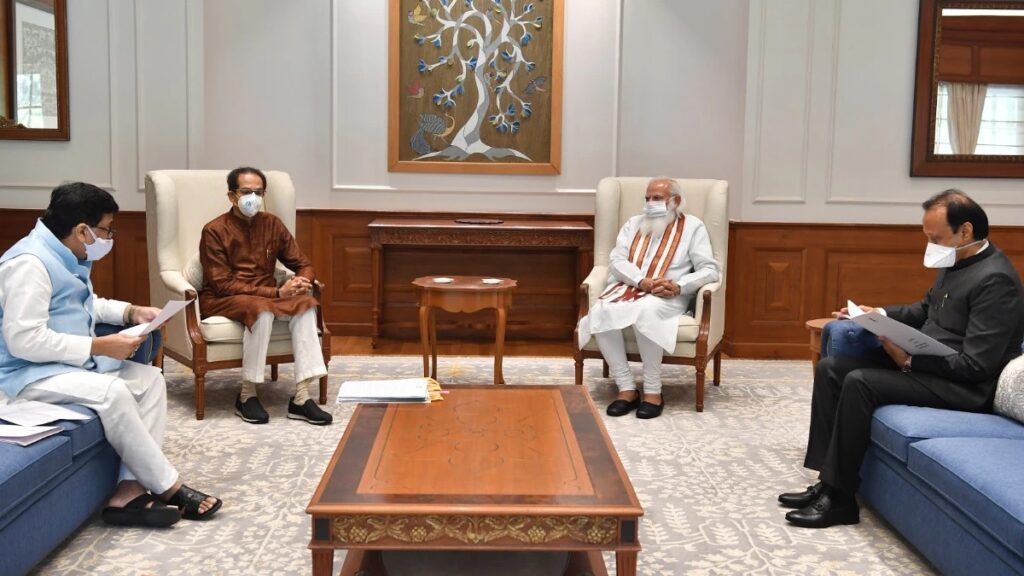
(File pic – Then CM of MVA govt Uddhav Thackeray met PM Narendra Modi)
As such, the outcome of the Maharashtra elections could indeed have implications for Narendra Modi’s aspirations for a third term, underscoring the significance of the state in national politics.
The aftermath of the 2019 Maharashtra state assembly polls indeed marked a significant turn of events for the BJP and its alliance with Shiv Sena. The political dynamics surrounding the 2019 Maharashtra state assembly polls were indeed complex and consequential, leading to significant shifts in power and alliances within the state. The BJP’s performance, winning the highest number of seats with 105 and garnering support from independent legislators, initially positioned it as a strong contender for forming the government.
However, the unexpected alliance between Shiv Sena, Congress, and the NCP, which allowed Shiv Sena to form the government, thwarted the BJP’s efforts to retain power. This development was undoubtedly a blow to the BJP, particularly to leaders like Devendra Fadnavis, who had played a prominent role in the party’s campaign. This development led to a period of political upheaval and recalibration within Maharashtra.
The split between the Shiv Sena, orchestrated under the leadership of Eknath Shinde with the backing of the central BJP leadership, was emblematic of the shifting alliances and power struggles within the state. Eknath Shinde’s ascension to the role of Chief Minister further underscored these changes, while Devendra Fadnavis, the former Chief Minister and prominent BJP leader, found himself in a subordinate position as Deputy Chief Minister.
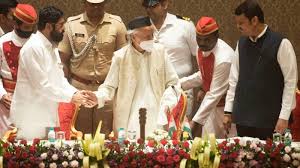
The subsequent split within Shiv Sena, orchestrated under the leadership of Eknath Shinde with the support of the central BJP leadership, reflects the intricate power struggles and calculations within Maharashtra politics. Shinde’s elevation to the position of Chief Minister further underscores the BJP’s strategy to assert its influence in the state, albeit through different channels.
For Fadnavis, who had previously served as Chief Minister, this transition likely brought about feelings of frustration and humiliation, especially being relegated to a junior role within his own party’s administration. This series of events highlighted the complexities and internal dynamics of Maharashtra politics, with power struggles often taking centre stage.
The sidelining of Fadnavis, despite his previous tenure as chief minister, and his appointment as deputy chief minister under Shinde’s leadership, represents a significant shift in power dynamics within the BJP.
The political manoeuvres and strategies employed by the Modi-Shah duo in Maharashtra reflect their efforts to expand the BJP’s base and consolidate power within the Mahayuti government. Initially, there was an expectation that leaders like Eknath Shinde could help broaden the party’s appeal, particularly among the Maratha community. However, it seems that Shinde’s limitations and lack of widespread influence became apparent over time, especially beyond his stronghold in Thane.
To counteract this, the BJP turned to creating splits within other parties, such as the NCP under the leadership of Ajit Pawar, with the aim of bolstering their coalition and weakening opposition forces. However, the Lok Sabha elections exposed Ajit Pawar’s own limitations, particularly in his home turf of Baramati, where the BJP had to invest considerable effort to secure victory for Ajit’s wife, Sunetra Pawar.
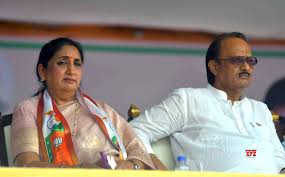
Recent reports indicating potential losses for Ajit Pawar’s party candidates, including Mahadev Jankar in Parbhani who contested as fifth candidate from Ajit Pawar’s quota, suggest that his political influence might be waning. This underscores the fluid and unpredictable nature of politics, where even seemingly strong leaders can face challenges and setbacks, especially in fiercely contested electoral battles.
There is a significant disparity between the public statements of BJP leaders in Maharashtra and the confidential assessment provided to the party’s leadership in Delhi. While BJP leaders in the state are making optimistic claims about the Mahayuti’s electoral prospects, a confidential report from the state BJP leadership suggests a more subdued projection of winning only 23 out of the 48 seats in Maharashtra.
Such internal assessments are common in political parties, where strategic planning and realistic evaluations of electoral outcomes are crucial. Ultimately, the true outcome will only be revealed when the votes are counted, but these differing perspectives within the BJP highlight the challenges and uncertainties inherent in electoral politics.
If the information from these sources is accurate, it suggests a significant shift in the BJP’s electoral expectations and strategy in Maharashtra. Despite the efforts to expand the Mahayuti coalition by bringing in leaders like Eknath Shinde from Shiv Sena and Ajit Pawar from NCP, the BJP seems to be tempering its expectations for the upcoming elections.
The reported projection that Ajit Pawar may not win any seats, and even his wife might face defeat by a narrow margin, indicates a challenging electoral landscape for the NCP leader and his party. Similarly, Chief Minister Eknath Shinde’s anticipated victory in only two to three seats suggests limitations to his electoral appeal beyond his stronghold.
The fact that the BJP is relying heavily on its own candidates, with an expected majority of 20 to 21 seats out of the projected 23, underscores a shift towards prioritizing the party’s own strength and resources in the electoral battle.
Overall, if these reports are accurate, they paint a picture of cautious optimism mixed with pragmatism within the BJP’s electoral strategy in Maharashtra, highlighting the complexities and uncertainties of state politics.
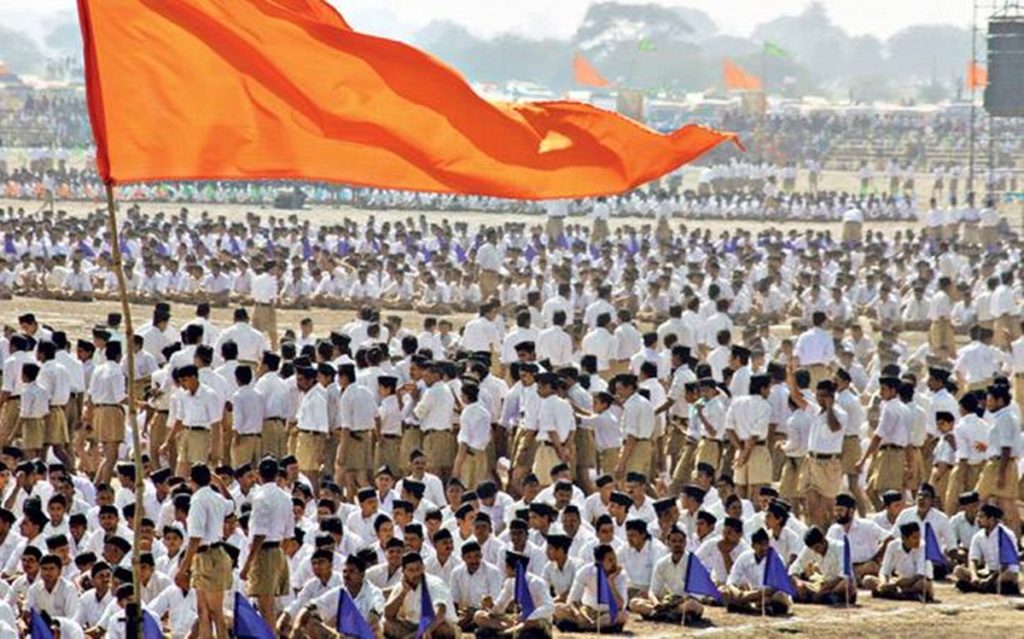
The sources from the RSS, on condition of anonymity, said that the RSS was not happy with the inclusion of Ajit Pawar, particularly due to his reputation for corruption, in the BJP-Shiv Sena government. “The BJP-Shiv Sena government was running smoothly, and the result in the Lok Sabha might be different if Ajit was not with us. Even people did not like the practice of the BJP to split Shiv Sena and the NCP to fulfil the power hunger of a few leaders of the state,” said the RSS source.
He claimed that a few top RSS leaders met union home minister Amit Shah in Pune after Ajit was included in the government and told Shah that the cadre could not justify to voters why Ajit’s party was included in the government, but Shah told us that numbers are important in the elections and to remain in power, so the cadre’s responsibility is to convince voters.
He further said that hardcore BJP workers, too, did not like to split the parties. “In the BJP, there is only one mission to elect Modi for the third time, and all-party workers followed it. But certainly, some percent of supporters remained absent from the polling process. It would be a loss for the party,” said the RSS source.
The sentiment expressed by the RSS source underscores the importance of party unity and cohesion, especially when it comes to rallying support for key figures like Prime Minister Modi. The division caused by the inclusion of Ajit Pawar and the perceived departure from the BJP’s core mission could indeed lead to some disengagement among party supporters, potentially resulting in electoral losses.
Eknath Shinde’s handling of Manoj Jarange’s hunger strike led to a significant debacle, particularly with regards to the violence that erupted in Antarvali Sarati and other areas. The Sena leaders’ claims about Shinde’s aspirations to become a leader of the Kunbi community, particularly concerning the support base of Ajit and Sharad Pawar’s NCP among the upper class of Marathas.
Shinde’s failure to effectively manage the situation, coupled with his diminishing influence within the central BJP leadership, suggests a challenging period for him politically. The inability to quell the violence and maintain control over the situation not only undermines his leadership but also raises questions about his ability to navigate complex socio-political issues as the Chief Minister.
The impact of Manoj Jarange’s influence appears to be significant, extending beyond Marathwada into North and Western Maharashtra, potentially affecting several Lok Sabha constituencies. It was said that the BJP-Shiv Sena-NCP alliance could suffer losses due to Jarange’s power, leading to a decrease in the overall tally of the Mahayuti alliance.
The notion of an anti-Modi wave silently working in Vidarbha, North Maharashtra, and other parts of the state contrasts with the BJP’s dismissal of such sentiments, attributing them to what they perceive as bias in the media. However, some within the BJP, as well as leaders from the Ajit Pawar-led NCP faction, acknowledge that there’s a groundswell of dissatisfaction among the common people, which is manifesting in the electoral process despite the leaders’ attempts to control the narrative.
There is an observation that in some constituencies that state leaders of Congress did not work for their own party candidates; however, voters have expressed their discontent with the BJP and Modi through their electoral choices. This is the indication of growing influence of grassroots sentiments and dissatisfaction with established political leadership, transcending traditional party affiliations.
Considering this situation and the expected poor result in Maharashtra, the central BJP leadership is considering replacing Chief Minister Eknath Shinde with the BJP leader. “Under Shinde’s leadership, the BJP could not win the state assembly polls. If we want to come into power again, then the BJP should take charge of the state or lose the state after the 2024 assembly polls,” said a senior leader of the party.
The statement from the senior BJP leader suggests a growing dissatisfaction within the party regarding Eknath Shinde’s leadership, particularly in light of the anticipated poor electoral performance in Maharashtra. The failure to secure victory in the state assembly polls under Shinde’s leadership has apparently prompted discussions within the central BJP leadership about the possibility of replacing him with a BJP leader.
This move reflects the party’s recognition of the need for a strategic shift in leadership to improve its prospects in Maharashtra. The looming threat of losing power in the state after the 2024 assembly polls underscores the urgency perceived by the party leadership to address the current challenges and regain political momentum.
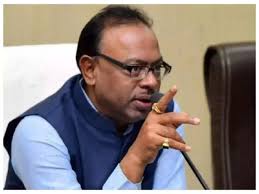
However, state BJP president Chandrashekhar Bawankule, refuted any such movement by the party. “Why should Shinde be replaced at this moment? What wrong did he do?” questioned Bawankule and said that he doesn’t think there will be any change until the assembly polls.
Bawankule’s questioning of why Shinde should be replaced and his defence of Shinde’s actions suggest a strong stance against any perceived movement within the party to replace him. His statement also indicates a level of confidence in Shinde’s leadership capabilities and suggests that any potential changes in leadership may not occur until after the upcoming assembly polls.
When asked by the leader of Shinde Sena about the possibilities, he reacted with an anger. “If Shinde is removed, we will not remain silent spectators. We will show our strength to the BJP,” said the Sena leader. The response from the leader of Shinde Sena indicates a strong opposition to the possibility of Eknath Shinde being removed from his position as Chief Minister of Maharashtra. The statement suggests a firm resolve to resist any such move by the BJP, emphasizing that they will not passively accept Shinde’s removal. It indicates that any decision regarding Shinde’s leadership could have broader implications for the stability of the coalition and the balance of power within the state.
The upcoming assembly election in October places considerable pressure on the Mahayuti government to address issues and demonstrate its effectiveness compared to the previous Maha Vikas Aghadi government led by Uddhav Thackeray. The limited timeframe of four months presents a challenge for the government to implement damage control measures and showcase its achievements to the electorate.
The BJP faces a dilemma regarding the leadership of Eknath Shinde, considering the potential unrest among his supporters if he is replaced. On the other hand, handing over the chief ministerial seat to an experienced leader like Devendra Fadnavis or another OBC leader could be a strategic move to bolster the party’s prospects in the election.
However, any decision regarding Shinde’s leadership or the selection of a new Chief Minister must carefully consider the potential consequences and reactions within the party and the coalition. Ultimately, the results of the polls will provide valuable insight into the electorate’s preferences and will likely influence future political strategies and decisions.

Now the question is whether Chief Minister Eknath Shinde will be replaced by the BJP leader? The decision to replace Chief Minister Eknath Shinde with a BJP leader depends on various factors, including internal party dynamics, electoral considerations, and the assessment of Shinde’s leadership performance. While there may be speculation and discussions within the party regarding this possibility, it’s ultimately up to the central BJP leadership to make such a decision.
The conflicting statements and viewpoints within the party suggest that there isn’t a consensus on this matter, and the final decision may be influenced by a range of factors, including the upcoming assembly election and the need to address internal party dynamics and coalition stability. The political landscape in Maharashtra is fluid, and decisions regarding leadership changes are often influenced by a combination of strategic considerations and party dynamics.



I discovered your weblog web site on google and test a couple of of your early posts. Continue to maintain up the excellent operate. I just further up your RSS feed to my MSN News Reader. Looking for ahead to reading more from you afterward!…
Thank you for your sharing. I am worried that I lack creative ideas. It is your article that makes me full of hope. Thank you. But, I have a question, can you help me?
Thanks for sharing. I read many of your blog posts, cool, your blog is very good. https://www.binance.com/zh-CN/join?ref=VDVEQ78S
can i order clomiphene for sale can you get cheap clomiphene without insurance can you get clomid pills clomid for men can i purchase generic clomid without insurance how to buy cheap clomiphene without dr prescription how to get cheap clomiphene price
More articles like this would frame the blogosphere richer.
More articles like this would frame the blogosphere richer.
Can you be more specific about the content of your article? After reading it, I still have some doubts. Hope you can help me.
how to get domperidone without a prescription – buy sumycin 250mg online cheap flexeril drug
order augmentin 1000mg pill – atbioinfo order ampicillin sale
buy nexium 20mg generic – nexiumtous buy esomeprazole 20mg generic
warfarin 5mg us – https://coumamide.com/ order losartan 25mg pill
order mobic 7.5mg – relieve pain meloxicam 7.5mg without prescription
best ed pill for diabetics – natural pills for erectile dysfunction buy ed pills tablets
buy diflucan pill – https://gpdifluca.com/# buy diflucan 100mg without prescription
escitalopram sale – https://escitapro.com/# order escitalopram 20mg pills
cenforce cheap – https://cenforcers.com/ cenforce 100mg ca
is there a generic cialis available – https://ciltadgn.com/# tadalafil pulmonary hypertension
tadalafil dose for erectile dysfunction – free cialis samples cialis from mexico
zantac without prescription – order generic zantac zantac 150mg price
cheap 100mg viagra – https://strongvpls.com/# viagra online pills
I couldn’t resist commenting. Warmly written! order generic neurontin 600mg
The sagacity in this ruined is exceptional. este sitio
More articles like this would remedy the blogosphere richer. https://ursxdol.com/doxycycline-antibiotic/
This is the compassionate of scribble literary works I positively appreciate. https://prohnrg.com/product/lisinopril-5-mg/
I couldn’t hold back commenting. Adequately written! qu’est que c’est fildena
This is the compassionate of writing I rightly appreciate. https://ondactone.com/simvastatin/
This is a topic which is forthcoming to my fundamentals… Myriad thanks! Quite where can I upon the contact details an eye to questions?
https://proisotrepl.com/product/propranolol/
I couldn’t hold back commenting. Well written! http://www.gtcm.info/home.php?mod=space&uid=1158217
forxiga 10mg ca – https://janozin.com/ dapagliflozin 10 mg price
buy xenical pills – this buy orlistat cheap
This is the stripe of glad I get high on reading. http://zqykj.com/bbs/home.php?mod=space&uid=303389
You can shelter yourself and your family by being alert when buying prescription online. Some druggist’s websites control legally and sell convenience, secretiveness, sell for savings and safeguards as a replacement for purchasing medicines. buy in TerbinaPharmacy https://terbinafines.com/product/zanaflex.html zanaflex
You can keep yourself and your stock nearby being wary when buying panacea online. Some druggist’s websites function legally and offer convenience, privacy, cost savings and safeguards over the extent of purchasing medicines. buy in TerbinaPharmacy https://terbinafines.com/product/imitrex.html imitrex
I couldn’t resist commenting. Adequately written! TerbinaPharmacy
Greetings! Utter gainful par‘nesis within this article! It’s the petty changes which liking espy the largest changes. Thanks a lot towards sharing!
Đến với J88, bạn sẽ được trải nghiệm dịch vụ cá cược chuyên nghiệp cùng hàng ngàn sự kiện khuyến mãi độc quyền.
Khám phá thế giới giải trí trực tuyến đỉnh cao tại MM88, nơi mang đến những trải nghiệm cá cược thể thao và casino sống động.
Khám phá thế giới giải trí trực tuyến đỉnh cao tại MM88, nơi mang đến những trải nghiệm cá cược thể thao và casino sống động.
iwin – nền tảng game bài đổi thưởng uy tín, nơi bạn có thể thử vận may và tận hưởng nhiều tựa game hấp
mcluck Alaska https://mcluckcasinogm.com/ mcluck KS
Sweet Bonanza is a visual and winning delight packed with fruits and candies. Trigger sweet bonanza multipliers free spins and stack multipliers for epic payouts. Sweet dreams await!